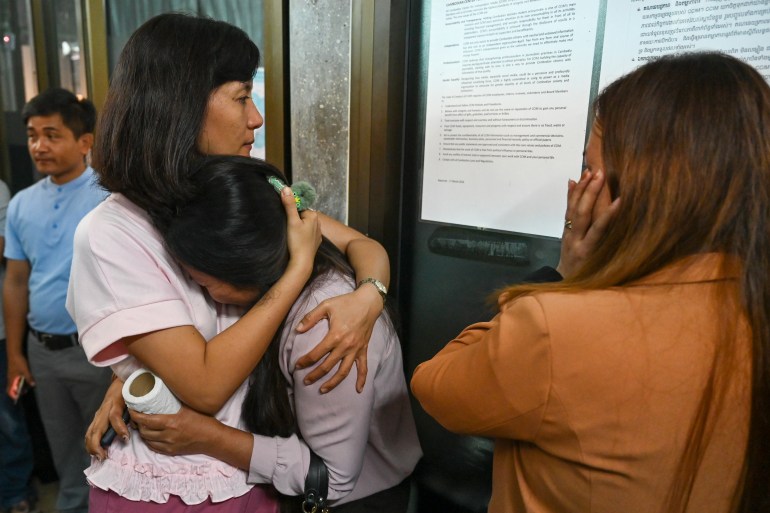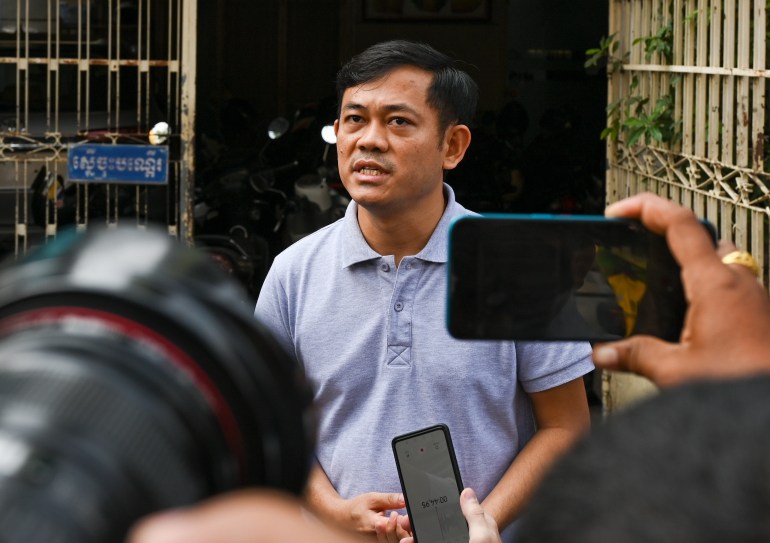Cambodia’s Hun Sen shuts down independent media outlet
Human rights groups say the closure of the media outlet VOD is a devastating attack on what remains of Cambodia’s free press.

Phnom Penh, Cambodia – Cambodian Prime Minister Hun Sen has shut down one of the country’s few remaining independent media outlets, with human rights organisations condemning the decision as a politically-motivated attack on the free press.
Following orders from Hun Sen, the government revoked the licence for Voice of Democracy (VOD) on Monday with access to VOD’s Khmer and English language websites blocked by some internet service providers within the country.
Keep reading
list of 4 itemsCambodia hotel-casino fire kills 26, electrical fault blamed
Cambodia convicts 36 opposition members in latest mass trial
Anti-Western and hyper macho, Putin’s appeal in Southeast Asia
The loss of VOD “will leave a gaping hole in Cambodia’s media landscape”, Naly Pilorge, executive director of Cambodian human rights group Licadho, told Al Jazeera.
The outlet’s sudden closure followed an order from Hun Sen over the weekend for VOD to apologise for and retract a February 9 Khmer language report that his son, Lieutenant General Hun Manet, had authorised $100,000 aid to Turkey in place of his father.
Hun Manet is set to take over the leadership of the ruling Cambodian People’s Party (CPP) once Hun Sen, who has been in power for nearly 40 years, steps down. But Hun Sen remains the CPP’s candidate for prime minister in elections that are scheduled to take place in July.
The VOD article was based on a quote from government spokesperson Phay Siphan, who told the outlet that “it is not wrong for Hun Manet to play his father’s role in providing aid to Turkey”.
In a social media post afterwards, Hun Manet denied he had authorised the aid, which VOD Khmer noted in a follow-up report.

Licadho noted in a statement that while Cambodia’s press law provides public figures with a legal avenue to seek retraction, the prime minister had given VOD only 72 hours to issue an apology before suddenly shortening the deadline to Monday morning.
The Cambodian Center for Independent Media (CCIM) — which runs VOD — sent Hun Sen a letter on Sunday expressing “regret” for any confusion caused by the article and asking for “forgiveness” for any perceived wrongdoing. But Hun Sen rejected it.
“Is it acceptable to use the words of regret and forgiveness instead of the word ‘apologise’?” the prime minister said in a Facebook post on Sunday evening. “For me, I cannot accept it.”
Even after CCIM issued a second apology in the early hours of Monday, the Cambodian leader chided the organisation on Facebook and said he had already made up his mind.
‘A lesson’
Minister of Information Kanharith Khieu called the decision to revoke VOD’s licence “a lesson for other media outlets” in a Facebook post.
“Institutions that do not correct their comments may face the same licence revocation!” he said on Sunday evening.
CCIM’s media director Ith Sothoeuth said he still believed there was a possibility to resolve the situation and that he had been in talks with the government.
“We hope this is not the end of everything yet, we will try our best to work with all relevant stakeholders, hopefully, the solution can be realised soon,” he told Al Jazeera.
Human Rights Watch’s deputy Asia director Phil Robertson said Hun Sen’s decision to close down VOD was based on the “silliest of rationales”. He believed the decision was directly connected to the outlet’s investigative reporting into human trafficking and cybercrime syndicates that have plagued Cambodia in recent years.
“The real losers in all of this are the people of Cambodia, who have now lost one of the last remaining independent, muckraking, anti-corruption media outlets that stood up for the interests of people and communities losing land, livelihoods, and rights to the pernicious corruption that underpins just about everything Hun Sen’s government does,” Robertson told Al Jazeera.
CCIM, which receives funding from the United Nations and the European Union, founded VOD in 2003 as a radio service and introduced VOD Khmer, a Khmer language news website, in 2011. While the government ordered VOD to stop broadcasting on airwaves in 2017, the organisation continued to put out audio programmes online.
Journalist Alex Willemyns says he co-founded VOD English in 2019 “to fill the vacuum” of independent English language media following the forced closure of The Cambodia Daily in 2017 and the sale of The Phnom Penh Post to a Malaysian owner with alleged links to Hun Sen the year after.
“Besides the obvious loss of its independent perspective on the big news of the day, there will be no one else left to consistently cover the small stories it covers each day that together become the kindling of the bigger stories,” Willemyns, who left Cambodia in 2020, told Al Jazeera. “VOD had become Cambodia’s news service of record.”

Willemyns says VOD’s closure sent a clear message to journalists to avoid any critical coverage of Hun Manet’s pending transition to power.
In several Facebook posts, Hun Sen seemed to revel in the demise of VOD, telling its staff: “Find a new job.”
Among the journalists now facing unemployment is Nhim Sokhorn who started off as a VOD security guard in 2007 before becoming a staff reporter three years later. The 57-year-old says he has devoted more than a decade of his life to being a voice for the voiceless and holding authorities accountable across Cambodia.
“As we see, there are hundreds of media outlets in our country, but how many media outlets dare to report the real issues in the country?” he told Al Jazeera. “Those who suffered injustice, the abuse of rights, the abuse of land.
“I think VOD will try to find a way to continue our mission despite the rain and the storm.”